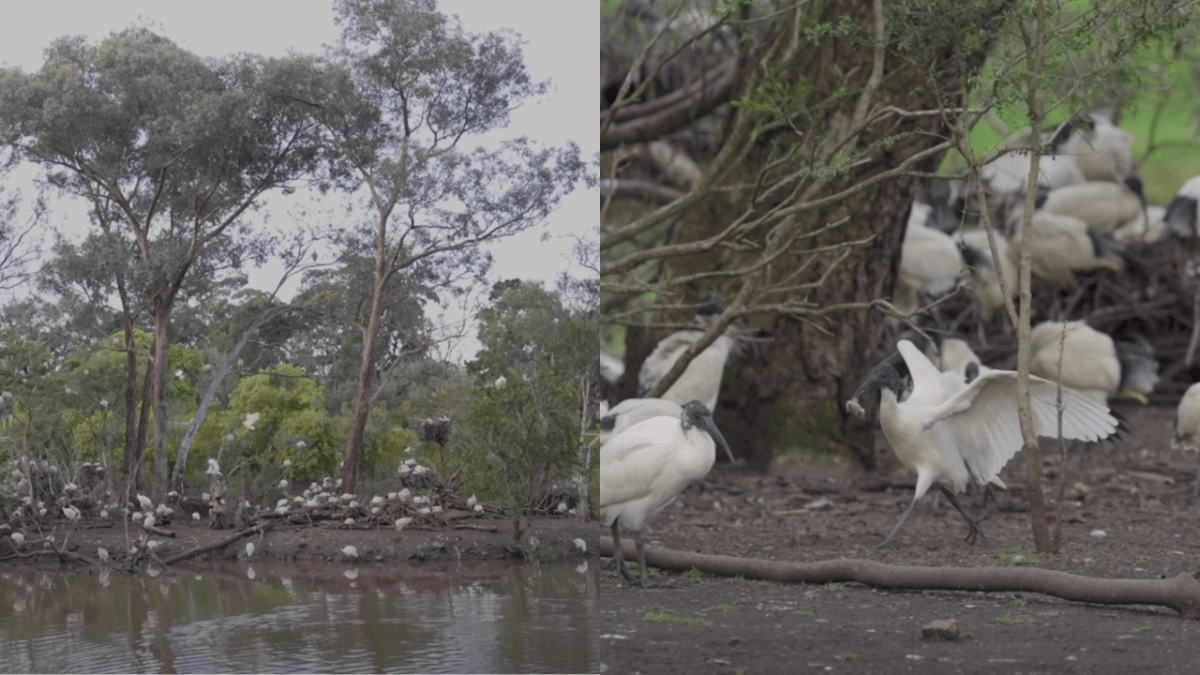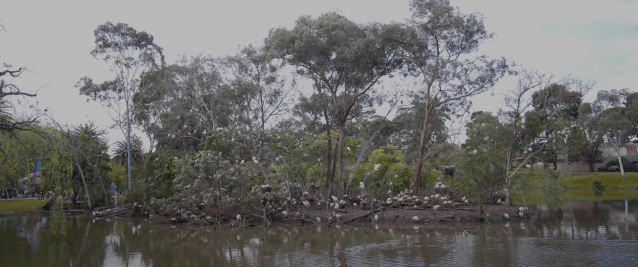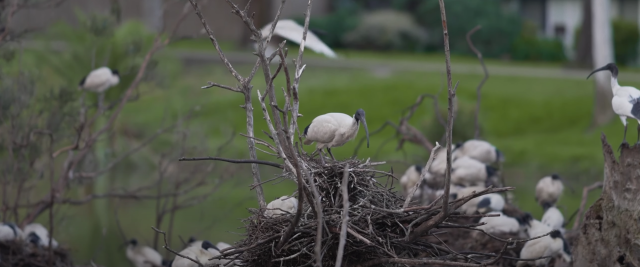
You’ve seen the azure waters of Hamilton Island in Qld, you’ve heard of the white sands of Kangaroo Island in SA, but I’m here to tell you Australia’s true natural wonder is found in suburban Melbourne and it’s officially named Bin Chicken Island. Seriously, search “Bin Chicken Island” on Google Maps and it’ll come up.
It’s a sliver of dirt in a small lake in Coburg with a few trees and a few hundred white ibis. It looks like a bin chicken zoo, or perhaps they’re the guards. Whatever’s going on it’s fucking bizarre.
Locals laugh about it, but very few know how the birds got there or why they stayed. Turns out, there’s a sinister side to the smelly islet.
“It’s a small island that has been taken over by white ibis in the last two or three years, so they’ve really built up,” vice president of community environment group Friends of the Merri Ann McGregor told PEDESTRIAN.TV.
Friends of the Merri conducts bird surveys of Coburg Lake and the Merri Creek four times annually and has found the ibis population has exploded, while the populations of other ducks and native birds that share the ecosystem have fallen dramatically.
“The number of different species has dropped off a lot. Quite a lot of the ducks have just flown off elsewhere” she said.
The native white ibis, which is a rare sight in Melbourne, was first recorded at Coburg Lake Reserve in 2009. The population growth was slow at first but sped up between 2018 and 2021 and reached more than 370.
“[Bin Chicken Island] is all things good for the ibis,” McGregor said.
“It’s protected from foxes and cats, predators, they’ve also found plenty of trees they like to nest in and roost in [and] there’s plenty of food in the area. People feed pigeons and ducks with bread around the lake but there’s also a waste transfer station, a tip, just nearby.
“They should be eating insects in grassland, that’s their natural diet, but they have adapted very well to cities and human food and rubbish.”
Basically, the chooks found a tiny spot they liked and colonised.

Numbers of Pacific black ducks have declined since bin chicken invasion from 60 to 80 to about five per survey since 2018. Black swans also used to share the lake but none have been recorded since 2020.
“They can get quite aggressive, they can harass other birds and think ‘this is our space, we’ll take it over’,” McGregor said.
Vegetation has also declined from being destroyed for nests and bin chicken poop is … *retch* … building up in the lake so much it’s causing toxic algal blooms which threaten the fish and water ecosystem.
Visitors have even reported concerns to the local Merri-bek council over bird aggression towards people.
Council ran a community meeting in 2021 to discuss concerns and created a White Ibis Management Plan with a number of steps to reduce the population.
Council told PEDESTRIAN.TV that actions from the plan including planting more native ground-covering plants on Bin Chicken Island and removing all woody debris, weeds and other potential nest materials were carried out in early 2022 and have resulted in a decrease in population so far.
But McGregor said because the birds naturally move around in winter it’s expected the population will swell again in September when they return to breed.

Council obtained a permit from the Victorian Department of Land Water and Environment this month for egg oiling, which is considered the cheapest, most effective and most humane method of breeding control in birds.
McGregor said Merri-bek council was taking it seriously and doing what they could but there were a few things locals and Bin Chicken Island tourists could do to help.
“One thing is people should stop putting out bread and other food for birds because the ibis are certainly taking advantage of that and bread is not suitable food stuff for birds,” she said.
So hop on the 19 tram this weekend and see the sights of Coburg. But please don’t feed the birds.



